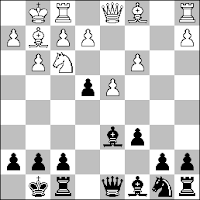Some thoughts:
1. Constant checking, looking around, and calculating is tiring
10 Seconds: The Pain Begins. 15 Seconds: You Can't Breathe. 20 Seconds: You Explode.
Looking around the board and casting glances to look for trouble takes a lot of power(?). Although I hesitate to call it power, I am after all just sitting around. But whatever it is, constantly thinking about tactics and the position is draining it.
Somewhere deep in the game, I started to feel this pressure in my cranium. Like a heavy load that settled on my head, I half expected to see blood pouring out of my nose.
Somewhere deep in the game, I started to feel this pressure in my cranium. Like a heavy load that settled on my head, I half expected to see blood pouring out of my nose.
So tired..
2. In search for a consistent man
A consistent soul believes in destiny, a capricious one in chance.
Benjamin Disraeli
It is not hard to check for every capture, threats or checks. What is hard is implementing it every move for the entire game. For example, the game was 40/40 and lasted for 28 moves and in my estimation me and my opponent took over 80 minutes to complete the game.
I could not sustain the energy necessary for the checking. I wavered in this position
I could not sustain the energy necessary for the checking. I wavered in this position
How to continue the attack?
And it was a critical juncture of the game too. But I started to slip into a kind of haze and started to miss things. Throwing the game to chance so to speak.
There were a lot of things I missed in here.. seeing them only after I had made several more moves. Of course I was fortunate that my opponent didn't see them too. But I have a feeling that a stronger opponent, say someone in the 1800's wouldn't miss such things.
I won but I really have to play better than this. It is not the same as losing, not quite but close.
But I have an idea - can this actually be a weapon? Can I inflict positions requiring massive calculation on someone hoping they'll crack and start to miss things? This is assuming of course that my own stamina is up to the task.
There were a lot of things I missed in here.. seeing them only after I had made several more moves. Of course I was fortunate that my opponent didn't see them too. But I have a feeling that a stronger opponent, say someone in the 1800's wouldn't miss such things.
I won but I really have to play better than this. It is not the same as losing, not quite but close.
But I have an idea - can this actually be a weapon? Can I inflict positions requiring massive calculation on someone hoping they'll crack and start to miss things? This is assuming of course that my own stamina is up to the task.
3. But I do indeed see more
Comparatively, I saw more threats and it did seem as if I prevented a lot of things from happening. For example, the move 11.Bg2 was prophylactic in nature. h3 was weakness that he could attack. Perhaps not immediately but in a move or two, it could have happened.
4. But I didn't see enough
Or as I've said, I saw too late. It was fortunate that my opponent didn't play Nd3, and in combination with maneuvering his other Knight. e.g. Nd7-Ne5 or maybe Nd7-Nc5 my rooks would have been prevented from moving into the D or F file and he would have a nicely posted knight in there. It might have been temporary but in the interim it would have posed me some problems.
Did I see this? Only when it was too late for by then my rook have occupied the files.
Seeing too late is bad enough but much worse is...
Did I see this? Only when it was too late for by then my rook have occupied the files.
Seeing too late is bad enough but much worse is...
5. Blindness
There are particular moves I don't see, a form of 'blindness' I seem to possess.
For example in the diagram below (White to move)
The correct answer was Ng5. But I looked and I looked an all I can come up with is Nd2. Now why is it that I can see Nd2 but the possibility of Ng5 escaped me? I didn't even consider it. It was as if the move was non-existing. A totally alien concept that it didn't event register though I must have looked at this position for close to ten minutes. This move and moves like this seems to reside on a NULL zone of my mind.
Well, at least there was an improvement. Here's to hoping that constant practice will enable me to lengthen the time I can concentrate on the board. Perhaps if I can do an hour of uninterrupted thought, I can be satisfied.
Chess is difficult...

